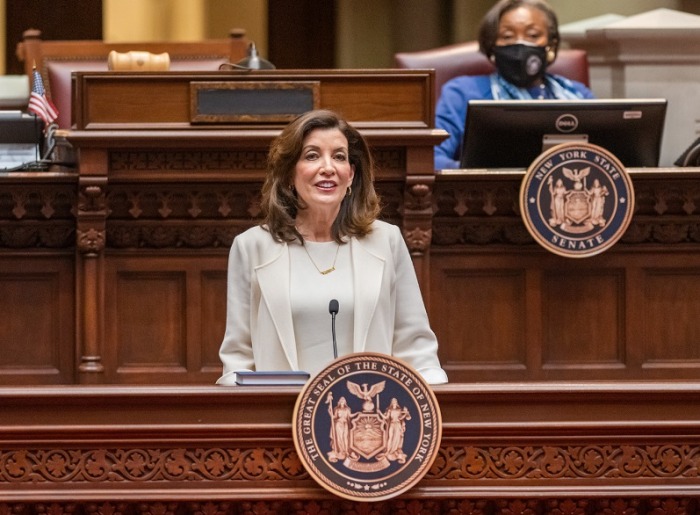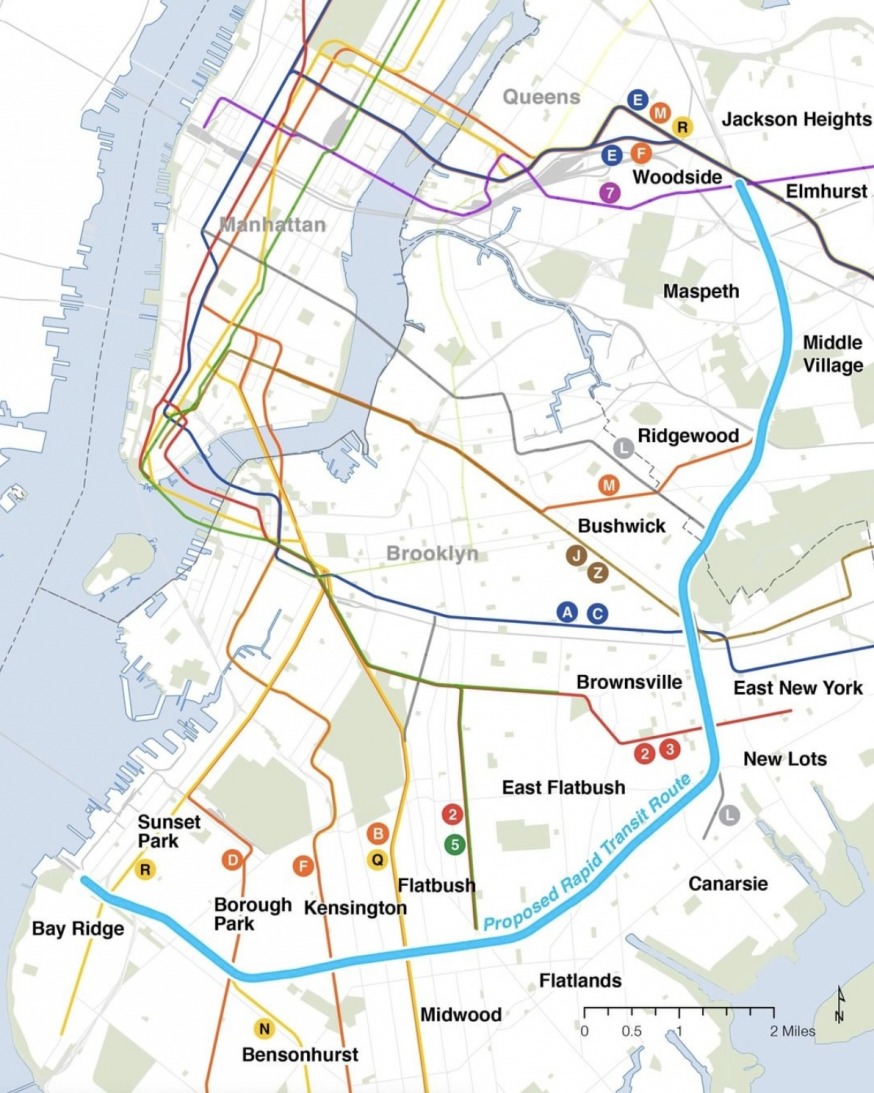
Governor Kathy Hochul delivering the 2022 State of the State Address in the Assembly Chamber Jan. 5 (Darren McGee- Office of Governor Kathy Hochul)
Jan. 5, 2022 By Allie Griffin
Gov. Kathy Hochul announced during her “State of the State” address Wednesday an ambitious new project to connect Queens and Brooklyn via a largely unused railway.
The project, called the “Interborough Express”, calls for the conversion of an existing 14-mile freight line — running from Jackson Heights to Sunset Park — into a commuter railway. Its end-to-end travel time would be less than 40 minutes, according to the governor’s office.
“Today I’m announcing a bold idea. Take an old unused 14-mile-long right of way and create what we’re calling the ‘Interborough Express,’ a new rail service that will connect Brooklyn and Queens,” Hochul said during her address.
She said she is directing the MTA to immediately commence an environmental review, the first step toward making the commuter line a reality.
The project aims to provide a transit option between the two outer boroughs as an alternative to the Manhattan-centric subway lines. Currently, many New Yorkers who commute between the two boroughs have to take the subway through Manhattan to get to their final destination.
The railway would serve more than 100,000 New Yorkers on a daily basis, according to the governor’s office.
Queens Borough President Donovan Richards said many Queens residents lack dependable transit options to get to work in the two boroughs.
“For far too many Queens families, and the communities they call home, the inability to travel between boroughs in a quick and efficient manner has been an unnecessary detriment to their economic vitality,” Richards said in a statement.
The Interborough Express would utilize a portion of the Bay Ridge Branch freight rail that runs north-south through Queens and Brooklyn.

The proposed route of the Interborough Express (MTA via Instagram)
The service would connect the Queens neighborhoods of Jackson Heights, Elmhurst, Maspeth, Middle Village and Ridgewood and the Brooklyn neighborhoods of Bushwick, East New York, Brownsville, New Lots, Flatlands, Flatbush, Midwood, Kensington, Borough Park and Sunset Park.
Many of these communities have no rail transit. The Interborough Express would change that by adding stops in these areas.
“New Yorkers deserve reliable public transit that connects them from work to home and everywhere in between,” Hochul said in a statement. “The Interborough Express would be a transformational addition to Brooklyn and Queens, cutting down on travel time and helping neighborhoods and communities become cleaner, greener and more equitable.”
Hochul said the proposed railway would offer connections to as many as 17 existing subway lines as well as the Long Island Rail Road. She said it would also spur economic growth in those communities in the future.
The rail line would reach roughly 900,000 residents who live in neighborhoods along its route, according to the governor’s office.
Richards commended Hochul for getting the project off the ground.
“By transforming the existing freight line running between Bay Ridge and Jackson Heights into a public transit option, we can connect thousands of Queens and Brooklyn families to new employment opportunities in each borough, while dramatically cutting commute times in the process,” he said.
Hochul said that the railway could be still be used for moving goods as well.
Transportation planners believe that rail freight and passenger service can work together in concert along the Interborough Express, the governor said.
She added that rail freight service would help reduce truck congestion and fortify supply chains struggling to recover from the pandemic.
The state’s project is similar to a proposal drafted by the NY, NJ and CT-focused transit advocacy group Regional Plan Association in the 1990s. The proposal called “The Triboro” suggests creating a commuter rail on the same existing tracks through Queens and Brooklyn but extending it into Astoria and the Bronx.
The organization thanked the governor on Twitter.
“RPA proposed the Triboro in 1996 – now it’s taking another huge step forward,” the Regional Plan Association tweeted. “This historic link would improve quality of life & connect residents – especially underserved communities – to more opportunity.
? TRIBORO IS MOVING FORWARD ?@GovKathyHochul just announced @MTA will launch an environmental impact statement for Interborough Express, an above-ground rail line using existing tracks through Brooklyn and Queens, and two-thirds of RPA’s Triboro proposal #StateOfTheStateNY pic.twitter.com/rxOb0oyhGk
— Regional Plan (@RegionalPlan) January 5, 2022
Another pro-public transportation organization, the Riders Alliance, also applauded Hochul’s announcement.
“Governor Hochul’s proposed Interborough Express would dramatically improve access to the city for millions of people in Brooklyn and Queens,” said Riders Alliance Policy & Communications Director Danny Pearlstein. “It’s a major advance toward transit equity and a critical tool in the fight against climate change.”
One Comment

Was Governor Hochuls ghost speech writer aware that for decades this has been known as the TriBoro X Express? It includes service connecting the Bronx. The project will easily cost billions. Bronx residents will not be happy that Hochul has cut them out of the project.
There have been no environmental documents or design and engineering efforts necessary to validate any construction cost estimates Progression of final design refines the detailed scope of work necessary to support construction. The final cost would never be known until completion. Costs would be refined by award of construction contracts followed by any unforeseen site conditions and change orders to the base contracts during the course of construction.
There are serious legal and operational issues to be resolved with the Federal Rail Road Administration. They have regulatory jurisdiction over significant portions of the proposed route which would run adjacent to existing active freight tracks. Subway and freight trains have to coexist on the same narrow corridor.
There is also a conflict at the Bay Ridge, Brooklyn terminus. This is also a potential site for a connection to the proposed $10 billion Cross Harbor Freight Tunnel project.
(Larry Penner — transportation advocate, historian and writer who previously worked for the Federal Transit Administration Region 2 New York Office. This included the development, review, approval and oversight for billions in capital projects and programs for the MTA, NYC Transit, Long Island Rail Road, Metro North Rail Road, MTA Bus, NYC Department of Transportation along with 30 other transit agencies in NY & NJ).